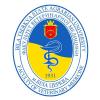The staff of the Department of Epidemiology and Infectious Diseases of the Faculty of Veterinary Medicine of the BNAU sincerely congratulates everyone on Vyshyvanka Day!
Vyshyvanka is a symbol of our culture, history and unity. It unites us as a nation and as people who value freedom.
In this difficult time, when trials become part of our lives, it is important to remember what unites us. We are proud of our country and believe in the Victory. 💙💛
Happy Vyshyvanka Day!
Taras Tsarenko
